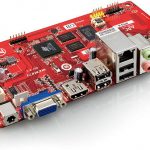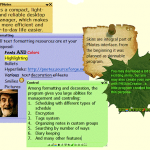Anonymous hack of DOJ causes more embarrassment than actual harm

On Monday, hacktivist group Anonymous announced it will be releasing 1.7 gigabytes of private data it has acquired from the United States Department of Justice, in an event it called "Monday Mail Mayhem." The group claimed the act was being done to "spread information, to allow the people to be heard and to know the corruption in their government. We are releasing it to end the corruption that exists, and truly make those who are being oppressed free."
New York-based security company Identity Finder ran an analysis on the data after it was released on Tuesday, and found the file dump actually contained no sensitive personal information, no secret internal documents, and no internal emails.
Xara Photo & Graphic Designer MX 8.1 review

Equipping your PC for professional graphics work normally involves buying several different applications, learning their various interfaces and hoping they’ll somehow all work together.
Xara’s philosophy is a little different, though: their new Photo & Graphic Designer MX 8.1 can handle photo editing, illustration, vector drawing, DTP, web graphics, even simple Flash animation, and all in a single $89 application.
Protect your accounts with Sticky Password

The ever-present need for security means that every account that you have online, and probably on your computer as well, needs to be protected with a username and password. If you have taken the wise step of ensuring that all of your passwords are different, this will undoubtedly mean that you have an incredible number of passwords to remember.
Sticky Password is a free tool that can store all of your passwords in a secure database and save you having to remember them by automatically filling in login information for you. Sticky Password 6.0 has just been released and there’s a lot to look forward.
Are Facebook bankers backers or backstabbers?

What's the measure of Facebook's IPO? MBAOnline sent us a couple of infographics explaining just that (see them below the fold). But I must qualify that they don't take into account downward trends and some nasty behind-the-scenes backstabbing. Late yesterday, writing for Reuters, Alistair Barr reports that ahead of Facebook's Friday IPO, lead underwriter Morgan Stanley reduced revenue forecasts during the roadshow promoting the public offering. JPMorgan Chase and Goldman Sachs did similarly.
Fallen dot-com stock analyst and risen tech news publisher Henry Blodget adds perspective. "This by itself is highly unusual (I've never seen it during 20 years in and around the tech IPO business)", he observes. "But, just as important, news of the estimate cut was passed on only to a handful of big investor clients, not everyone else who was considering an investment in Facebook". Uh-oh, selective disclosure violates SEC rules.
Open source software comes of age

More than half of all software acquired by IT in the next five years will be open source, according to a new study, and open source software (OSS) leads in the areas of cloud, big data, mobile apps and enterprise mobility.
"Taken together with applications like mobile and enabled by cloud, we are entering an exciting new era of 'Open Innovation on Demand,' where not only can OSS innovate faster, it can be deployed immediately and consumed as a service from the cloud", says Michael Skok, general partner at North Bridge Venture Partners, one of the sponsors of the survey.
Larry Page: 'Motorola is a great American tech company'

Googorola is now a reality. Today, Google formally completed its Motorola acquisition, after completing the final hurdle, approval from China, over the weekend. The approval came with conditions -- that Google keep Android open for at least 5 years -- but the company had been on that track anyway.
Motorola is a big purchase, $12.5 billion, initiated in August 2011. With Motorola, Google gets an enormous cache of patents -- pending and approved around 24,000; enormous wealth in cellular research and development, manufacturing operations; and a heap load of headaches. Over the weekend, for example, International Trade Commission blocked entry to a majority of Motorola mobile products for violating a single Microsoft patent.
Raspberry Pi not enough for you? How about a $49 Android PC?

Taiwanese fabless semiconductor company Via Technologies on Tuesday unveiled its affordable, low power Android PC system, known simply as APC.
The $49 board uses the Neo-ITX form factor, which at 170 x 85 millimeters is the same length as Mini-ITX, but half as wide. It is powered by the VIA WonderMedia ARM 11 system on a chip, which is equipped with an 800MHz processor, 512 MB of DDR3 RAM, and has integrated GPU capable of video outputs up to 720p in resolution. It also has 2GB of NAND Flash storage, HDMI and VGA ports, four USB 2.0 ports, 1/8" headphone jack and mic input, microSD slot, and 10/100 Ethernet connectivity. The whole thing runs off of a 15 W power supply and is loaded with a version of Android 2.3 optimized for keyboard and mouse input.
Much like the wildly popular Raspberry Pi project PC which debuted last February, the APC is meant to be a "technology enabler" more than a powerhouse for computing. The board gives users with few resources the ability to build a cheap, usable computer without having to roll in the superfluous features associated with full-scale desktop OS computing.
Google+ will continue to grow whether people actually use it or not

With Facebook now public and sitting on a huge pile of cash, let’s turn the conversation to the social network’s most pressing competitor, Google. Google and Google+ don’t appear to present much of a threat to Facebook, but the game board was reset on Friday and tactics at both companies will change accordingly. Now Facebook has to find a way to grow revenue and users and will increasingly bump up against Google’s huge advantages in search and apps. For Facebook to achieve its goals, the company will have to enter both spaces with gusto.
Google has learned how to leverage its strengths and suddenly one of those strengths is Facebook’s success. Now that Facebook is a $100 billion company, it doesn’t hurt Google to be number two in that space. Who else is? Pinterest? Instagram? Twitter? None of those services offer a full-fledged social network for those who do want a Facebook alternative, and some people will.
PSNotes 9 adds spell checking, improves text-to-speech

Sticky notes apps are nowhere near as prevalent as they used to be, but that’s not to say that they aren’t still incredibly useful. There are fully featured PIMs such as Outlook that have somewhat taken over the role of such programs, but when you try out PNotes, you’ll understand once again just how great a simple, dedicated utility can be. The program is available in portable and installable desktop varieties and both offer the same great set of feature and the latest release, version 9, includes some great improvements and new features.
Just because a note is a quick , it doesn't need to be misspelled, and the latest release of the app includes an all-important spell checking feature. While there is support for English by default, it is possible to install others that you want to use. PNotes is the type of app that you are likely to find that you end up using a great deal and if you start to create a lot of notes you will undoubtedly make use of the grouping option to keep related notes together. Another new feature of the app makes it possible to define the default skin and coloring for groups.
Six lessons I learned about writing software

From independent software developers to the enterprise, everyone is looking for ways to improve software development, increasing productivity while not sacrificing performance. Software technologies continue to change, but have programmers really found the real keys to faster development cycles, more reliable software and improved performance?
While it is obvious we have more powerful software today, this does not mean we have better software today. As it becomes more complex, there are more things that can go wrong. In the old days, software was often written by a single programmer, while today software often is written by teams. The complexity alone of trying to get a team of programmers to work together is challenging enough, but add to this the size and scope of some applications that can be hundreds of thousands of lines of code, if not possibly in the millions of lines of code, and you can have a veritible nightmare trying to put it all together. Few trades today require so much attention to details at such a large scope as does programming.
GitHub for Windows released, developers rejoice

Code sharing site GitHub announced a client for Windows on Monday, aimed at making it easier to search for code on the platform. The move is an obvious nod to Microsoft's dominance in computing, and done more out of necessity than anything.
GitHub is built on top of the command line Git application, and has quickly begun to change the way software is developed. It makes the process of managing an open-source project a whole lot easier, and allows work on code by many developers versus a few "gatekeepers" who control what gets into daily builds.
Google mind reading comes to Gmail

I'm not the biggest Gmail fan. Sure, I use the service, but my inbox fills up too fast, and managing the madness is measured procrastination. Email in general is the problem; Google's service is simply easy to blame. But a new enhancement coming in days has me finally ready to adapt behavior to attitude -- and stop being the email file clerk.
Google is in process of adding nifty contextual, autocomplete capabilities to Gmail -- that is if you find this kind of soothsaying useful. I confess to making more typing errors when Google search autocomplete tries to anticipate my thoughts. Mind reader it is not enough, so what good is all that information Google supposedly collects about us all? :) As for Gmail, the new autocomplete starts with what you've got.
Leap promises a pocketable, compact 3D user interface

San Francisco startup Leap Motion today unveiled its killer product, a small USB-attached three dimensional sensor (a la Microsoft's Kinect) which is meant for use in small spaces on small screens. The product is called Leap and is available in limited quantities for just $70.
Leap creates an eight cubic foot interaction space, and Leap Motion says the tiny device is "200 times more sensitive than existing touch-free products and technologies." This is appealing because the current motion control interface of choice, Microsoft's Kinect, is a "living room" experiences which requires users to stand anywhere from six to eight feet away from the sensor. Leap can sit right on your desk and utilize only the space in front of you and around your PC if you so choose. This is one of the next big frontiers in interface design, as Belgium's Softkinetic announced a similar innovation at CES earlier this year, and notebook PC makers are looking to integrate similar features with stereoscopic webcams.
Smart technology procurement starts with identifying what you need

First in a series. Many IT professionals know how difficult major technology purchases can be. Projects like picking a new CMS system, selecting a data center or replacing helpdesk software are relatively infrequent. This means employees are not well-practiced with determining and organizing requirements or the product selection process.
They are often biased towards those products they already know, and may not be familiar with some others competing in that market segment. Throw aggressive sales people and tight deadlines into the mix and you have the recipe for a technology purchase that is decidedly not optimized for the business.
Mark Zuckerberg isn't embarrassed by Facebook's IPO

So Facebook is now a public company but with the shares only one business day old the news is already bad: Facebook shares didn’t pull a Google or a Yahoo or a Microsoft or even a TheGlobe.com and soar out of sight on IPO day. They ended right where they started pretty much after the day traders took their easy profits. And while Wall Street sees this performance as a dud, Facebook itself sees it as a masterful piece of financial engineering.
If you are an investment banker -- and let me re-emphasize that, if you are an investment banker -- you want IPO shares to go up on their first day, rising in price by at least 10 percent though no more than 20 percent. This shows the IPO is hot, the company is booming, yet the offering wasn’t so underpriced that the founders feel cheated. Such IPOs make investors feel happy and happy investors buy and sell more shares and participate in future IPOs.
© 1998-2024 BetaNews, Inc. All Rights Reserved. Privacy Policy - Cookie Policy.




